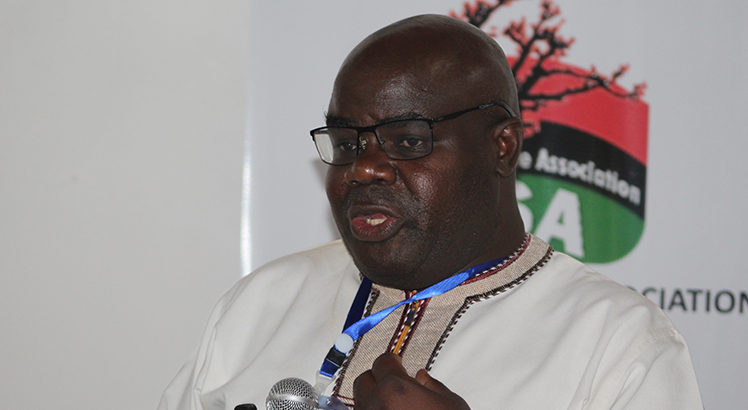Parties warned on elections
Political analysts have called on political parties in the country to draw lessons from Kenyan elections to have clear agendas and stop taking voters for granted if they are to remain relevant during elections.
University of Malawi political scientist Boniface Dulani and Nic Cheeseman, a professor of democracy at the University of Birmingham in England, expressed the sentiments in separate responses to The Nation inquiry on lessons Malawi can draw from Kenya where former vice-president William Ruto was declared winner of last Tuesday’s general elections.
Dulani observed that most political parties in Malawi hardly research to understand the political environment and what voters, especially young people, expect of their parties and the government they seek to form.
He advised politicians to stop taking voters for granted on the assumption of stronghold politics.

Dulani said: “Nowadays voters are becoming much more sophisticated, much more aware of what is going on and they can compare and evaluate the policies politicians are making for them and decide whether those promises are realistic or not. And they will vote based on that.
“The youth are no longer persuaded by ethnicity or the same old tried promises of the past that have never been fulfilled. Political parties need to offer fewer promises that are achievable rather than offering the moon when you can’t even deliver something as basic as food on the table.”
On 50 percent-plus-one, he said Kenya’s elections showed that it is possible for politicians in Malawi to win and lose government with pre-election alliances.
Dulani said: “What is clear with the Kenya election is that ultimately, issues do triumph over electoral alliances. It is also possible for someone to get 50 percent-plus-one even in the second round with or without an alliance.”
Malawi used the 50 percent-plus-one system to declare the winner of the June 23 Presidential Election following a February 3 2020 interpretation of majority by a five-judge panel of the High Court of Malawi sitting as the Constitutional Court which nullified the 2019 Presidential Election results for being fraught with irregularities. The interpretation was upheld by a seven-judge panel of the Malawi Supreme Court of Appeal.
Before the interpretation, only former presidents Bakili Muluzi and his successor the late Bingu wa Mutharika won their respective re-election bids in 1999 and 2009 with absolute majorities.
In a separate interview yesterday, Cheeseman said the main lesson from Kenya is that voters are feeling the pinch economically and are in no mood to vote for parties which do not seem to have much to offer.
He said performance is more important than ever.
On whether Kenyan elections can shape strategies for Malawian political parties, Cheeseman said: “We may see opposition leaders seeking to harness Ruto’s hustler approach and his emphasis on the bottom-up, especially as he has won against considerable odds. But how well they can do this will depend on the personality and history of the leader concerned.”
He said 50 percent-plus-one was significant in that it encouraged broad multi-ethnic coalitions to form and to that extent, it fosters a greater sense of inclusion and alliance formation.
“Despite this, however, we still see intense political competition and disagreement over the presidency,” Cheeseman said.
He also hailed Kenya’s Independent Elections and Boundaries Commission for doing a good job of collating and making available the key election forms.
In an interview last evening, Malawi Congress Party (MCP) spokesperson Maurice Munthali said the Kenyan election showed that the country is divided among ethnic inclinations, but stressed that the competitive race is good for checks and balances in a democratic set up.
On whether Malawian parties can run issue-based campaigns, he said: “MCP will always dwell on issues during any campaign trail, including the one leading to 2025 elections.”
Munthali also said there were programmes such as National Economic Empowerment Fund and National Youth Service aimed at empowering the youth.
UTM Party spokesperson Frank Mwenifumbo said Ruto’s victory is not just a lesson to Malawians, but also an example at continental level that there is an awakening and democracy is thriving.
He said: “Ruto has showed that you don’t need to be a son of somebody to win elections in Africa. We also have our own example [in Malawi]… President Lazarus Chakwera comes from no background of political elites. He is a man who rose from nowhere to become the President of Malawi.
“Equally, Ruto’s autobiography inspires many of us. We’ve seen his pictures when he had nothing, literally walking on foot with his wife, not knowing that one day he will become the President of Kenya.”
On his part, United Democratic Front (UDF) publicist Yusuf Mwawa claimed his party has been championing issue-based campaigns and expressed delight that “what we have been advocating is also what happened in Kenya”.
He said: “UDF believes that manifestoes or what we promise to the youth must be doable and realistic. When this is not done it creates apathy among the youth during the subsequent elections.”
Mwawa also said managing election results is key to improving credibility.
Ruto of the United Democratic Alliance or Kenya Kwanza Coalition won 50.5 percent of the vote against his main rival Raila Odinga’s 49 percent. Making his fifth attempt at the presidency, Odinga stood on the Azimio la Umoja (One Kenya Coalition Party) and had the backing of President Uhuru Kenyatta who ditched his two-term Vice-President Ruto.
In his first acceptance speech on Monday, Ruto largely attributed his victory to an issue-based campaign on a wide range of matters affecting Kenyans, including economic woes and the soaring youth unemployment.






One Comment